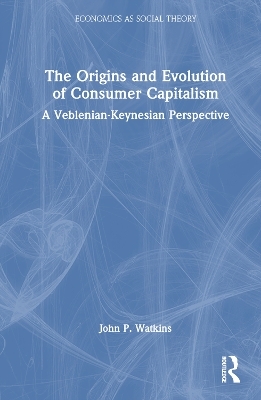
The Origins and Evolution of Consumer Capitalism
Routledge (Verlag)
978-1-138-33545-5 (ISBN)
Consumer capitalism arose with the second industrial revolution, the application of continuous-mass production to consumer goods during the late nineteenth and early twentieth centuries. This book adopts a Veblenian, Keynesian viewpoint, presenting an evolutionary view of consumption combined with the need to increase demand to match increases in production. The book traces the history of consumer capitalism, examining the paradox posed by applying continuous-mass production to produce armaments for dynastic ambitions versus consumer goods for the masses, manifesting itself in the world wars of the twentieth century. Multiple paradoxes at the heart of the story address booms leading to busts, over-producing countries in Asia relying on over-consuming countries in the West, and the expansion of demand depending on increasingly inventive ways of liquefying assets, in light of stagnant incomes. The book persuasively argues that these paradoxes result from capitalism’s incessant drive to accumulate capital, fostering conflict, crises, and depression. The latest paradox results from the impact of continuous-mass production on the environment, manifesting itself as the Darwinian dilemma. The dilemma stems from human beings largely winning the struggle for existence and, in the process, possibly making the earth uninhabitable, at least for humans.
John P. Watkins is Professor of Economics at Westminster College, Salt Lake City, Utah, and adjunct Professor of Economics at the University of Utah. He has taught economics for some 40 years, teaching the history of economic thought, macroeconomic theory, economic justice, and ecological economics. He is past president of the Association for Evolutionary Economics and the Association for Institutional Thought. He is winner of the Bill and Vieve Gore Excellence in Teaching Award, twice recipient of the Manford A. and June Shaw Faculty Publication Award, and voted six times Professor of the Year. His purpose in teaching is to raise the students’ level of confusion, a purpose which he is known to have accomplished with considerable success.
Acknowledgements
Preface
Chapter 1: The Paradoxes of Consumer Capitalism
Chapter 2: Towards an Evolutionary Theory of Consumer Capitalism: Thorstein Veblen and John Maynard Keynes
Chapter 3: Continuous-mass Production and The Rise of the Modern Corporation
Chapter 4: How to Absorb the Output? Consumerism versus Militarism: Veblen, Hobson, and Polanyi
Chapter 5: Keynes and The Great Depression: Poverty in the Midst of Plenty
Chapter 6: The Myopic Consumer and the Rational Economist: The Institutional Pattern of Consumption and Theories of Consumer Choice
Chapter 7: The Liquefication of Everything: Corporate Power and the Evolution of Consumer Credit
Chapter 8: America’s Perpetual Trade Deficit
Chapter 9: The Great Financial Crisis--A Test of Two Models: Minsky’s Financial Instability Hypothesis and the Dynamic Stochastic General Equilibrium Model
Chapter 10: Quantitative Easing versus Modern Monetary Theory: Overcoming the Limits of the Private Domestic Economy
Chapter 11: The Darwinian Dilemma: Winning the Struggle,
Making the World Uninhabitable
Chapter 12: Conclusion: The Civilization of Consumer Capitalism
| Erscheinungsdatum | 27.03.2023 |
|---|---|
| Reihe/Serie | Economics as Social Theory |
| Zusatzinfo | 15 Tables, black and white; 9 Line drawings, black and white; 9 Illustrations, black and white |
| Verlagsort | London |
| Sprache | englisch |
| Maße | 156 x 234 mm |
| Gewicht | 580 g |
| Themenwelt | Geschichte ► Teilgebiete der Geschichte ► Wirtschaftsgeschichte |
| Wirtschaft ► Allgemeines / Lexika | |
| Wirtschaft ► Volkswirtschaftslehre ► Wirtschaftspolitik | |
| ISBN-10 | 1-138-33545-2 / 1138335452 |
| ISBN-13 | 978-1-138-33545-5 / 9781138335455 |
| Zustand | Neuware |
| Informationen gemäß Produktsicherheitsverordnung (GPSR) | |
| Haben Sie eine Frage zum Produkt? |
aus dem Bereich


